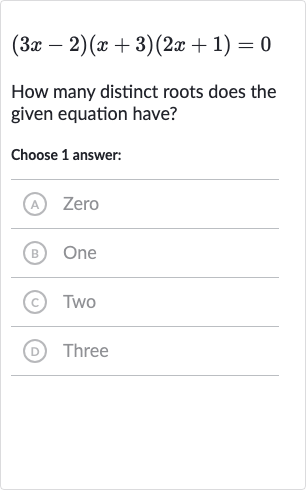Full solution
Q. How many distinct roots does the given equation have?Choose answer:(A) Zero(B) One(c) Two(D) Three
- Equation factors: The given equation is a product of three factors set equal to zero: . To find the roots, we need to set each factor equal to zero and solve for .
- Solving first factor: First factor: To solve for , we add to both sides of the equation:Now, we divide both sides by to isolate :We have found the first root, .
- Solving second factor: Second factor: To solve for , we subtract from both sides of the equation:We have found the second root, .
- Solving third factor: Third factor: To solve for , we subtract from both sides of the equation:Now, we divide both sides by to isolate :We have found the third root, .
- Number of distinct roots: We have found three distinct roots for the equation: , , and . Therefore, the correct answer to the question of how many distinct roots the equation has is .

